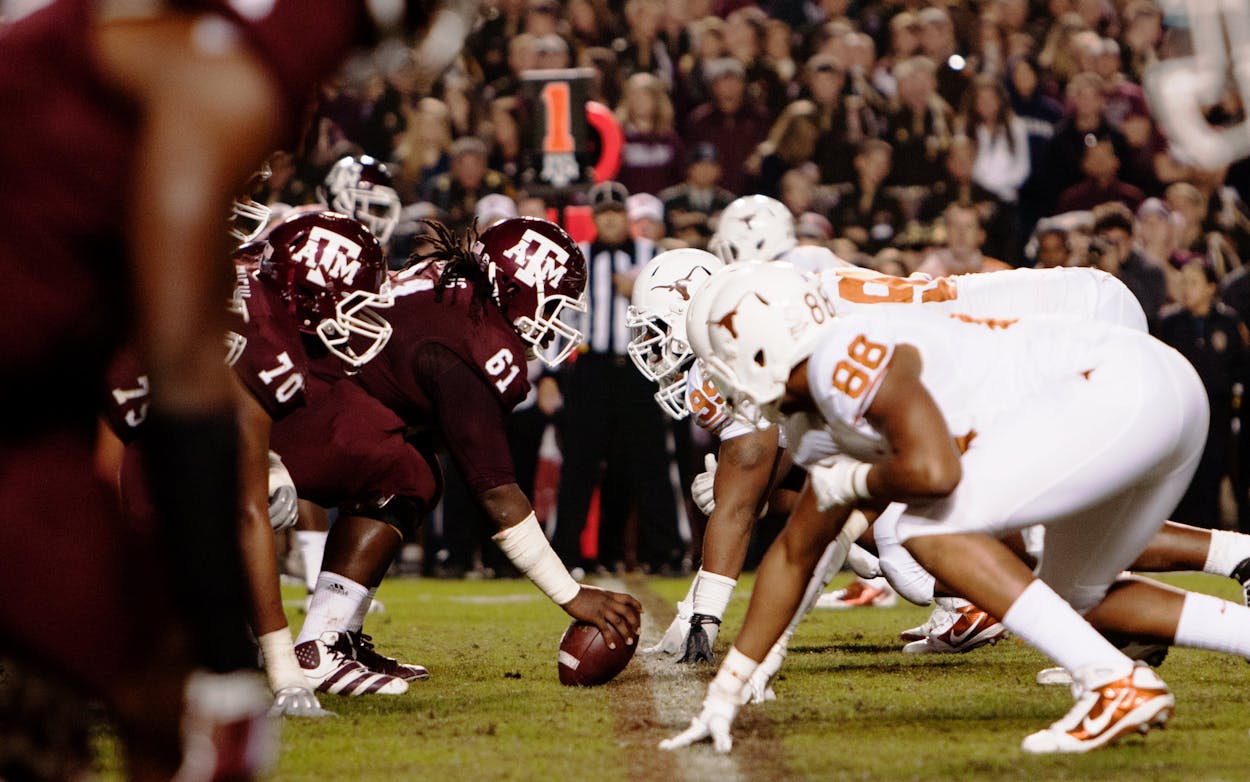From 1894 to 2011, the University of Texas and Texas A&M had one of the most historic football rivalries in all of sports. It’s more storied than Michigan—Ohio State, more relevant than Harvard—Yale or Army—Navy, and more Texan than UT—OU. They met a total of 117 times. But A&M jumped from the Big 12 to the SEC in 2011 and UT launched the Longhorn Network, and the two programs have not met on the gridiron since.
Almost everyone seems to acknowledge that having UT and A&M meet up again would be a good for Texas (and college football in general). And Republican state Representative Lyle Larson, a Fightin’ Texas Aggie himself, decided to do something to make it happen. Larson filed a bill on Tuesday that would require the two teams to meet up each year in November—and, if they fail to do so, would be stripped of state funding for their football scholarships. (Both athletic programs are self-supporting, and it’s unclear if that includes scholarships.)
Exploring a legislative path to reviving the rivalry isn’t a new concept. In 2013, Democratic state Representative Ryan Guillen (another Aggie!) filed a similar bill, which did not include a remedy should the teams fail to schedule a matchup.
A desire to see UT and A&M play again is bipartisan, in other words, and it’s even something that bridges the gap between Longhorns and Aggies. Governor Greg Abbott, a Longhorn, told reporters in 2017 that getting the two schools to meet on the field was a top priority for him in the next session before throwing a “hook ’em.”
It’s not unprecedented for state government to intervene in intrastate football rivalries. In 1947, after the Auburn–Alabama rivalry lay dormant for nearly forty years, the Alabama state legislature passed a resolution requesting that the schools resume playing the game that, a few years later, would be known as the Iron Bowl. While the resolution was non-binding, the following year the two university presidents agreed to renew the contest. In 1955, the Florida legislature attempted to establish a rivalry between the University of Florida and the then-relatively new program at Florida State. The bill, which would have required the two schools to meet in football and other sports, made it to the floor, but lost on a vote. Undeterred, Governor LeRoy Collins urged Florida to take on their state-funded opponent, and the rivalry was born.
Those moves came in a different era though. There was no SEC, no Longhorn Network, and college football—while popular—didn’t represent hundreds of millions of dollars in investments. Attempts to get the Aggies and the Longhorns to play again have thus far stalled out: a proposal from UT to challenge A&M in the 2022 and 2023 season came and went (A&M cited a non-conference schedule booked for the next ten years as the reason they couldn’t accept the challenge). Those bookings tend to be less than ironclad—schools can and do reconfigure their schedules—but now that A&M is in the dominant conference, renewing the rivalry benefits them less than it does UT.
Passing a law that would require the two schools to meet up under penalty of losing scholarships is a rather extreme move, and it’s one that seems unlikely to pass. But also, the Texas Legislature has passed some strange, prescriptive laws in the past. In 2017, the Lege passed a bill that was signed into law that effectively overturned local laws about who was allowed to remove trees on their property. That same year, a resolution was voted out of committee urging Texans not to use the Chilean flag emoji when texting about Texas. And it’s not just the 2017 Legislature, either. Back in 1973, they passed a law that’s still on the books making it a criminal offense for a person to possess six or more dildos (five or fewer are fine). A UT–A&M football law might seem unlikely to pass—and it probably is. But it also has bipartisan support, its not going to hurt anybody, and signing it would be one of the more universally popular things that Greg Abbott could do. In the Texas legislature, weirder things have definitely happened.








